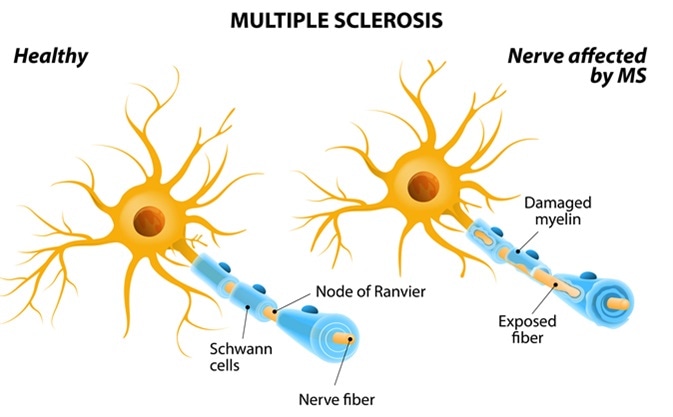S3, New Flavonoid Compound That Promotes Myelin Growth To Help Treat Various Nervous System Disorders
Source: Thailand Medical News Sep 07, 2019 6 years, 5 months, 1 week, 1 day, 5 hours, 14 minutes ago
Medical Scientists from Oregon Health and Science University (OHSU) have developed a compound that successfully promotes rebuilding of the protective sheath around nerve cells that is damaged in conditions such as multiple sclerosis. Trials in animal models has already been proven successful and the plans are underway to initiate human trials.

In the research study, the team from OHSU discovered that a molecule called hyaluronic acid, or HA, accumulates in the brains of patients with MS. Further, the researchers linked this accumulation of HA to the failure of cells called oligodendrocytes to mature. Oligodendrocytesare the cells that generate myelin.
Myelin, in turn, forms a protective sheath covering each nerve cell's axon:the threadlike portion of a cell that transmits electric signals between cells.
Damage to myelin and myelin no longer being produced is associated with MS, stroke, brain injuries, and certain forms of dementia such as Alzheimer's disease. In addition, delay in myelination can affect infants born prematurely, leading to brain damage or cerebral palsy.
The discovery culminates more than a decade of research following a 2005 breakthrough by the OHSU medical scientists team.
Senior author Professor Larry Sherman commented in a phone interview with Thailand Medial News "I think we'll know in about 10 months if this is the exact right drug to try in human clinical trials. If it's not, we know from the animal model studies that this approach can work. The question is, can this drug be adapted to bigger human brains?"
Further studies led by the Sherman lab showed that HA is broken down into small fragments in multiple sclerosis lesions by enzymes called hyaluronidases. In collaboration with Stephen Back, M.D., Ph.D., a professor of pediatrics in the OHSU School of Medicine, Sherman discovered that the fragments of HA generated by hyaluronidases send a signal to immature oligodendrocytes not to turn on their myelin genes. That led researchers to explore how they might block hyaluronidase activity and promote remyelination.
For the past 12 years, an international team of researchers led by OHSU has been working to develop a compound that neutralizes the hyaluronidase in the brains of individuals with MS and other neurodegenerative diseases, thereby reviving the ability of progenitor cells to mature into myelin-producing oligodendrocytes.
S3, a modified flavonoid,a class of chemicals found in fruits and vegetables reverses the effect of HA in constraining the growth of oligodendrocytes and promotes functional remyelination in animal models.
Professor Sherman further commented "It's not only showing that the myelin is coming back, but it's causing the axons to fire at a much higher speed. That's exactly what you want functionally."
The next phase of research involves testing, and potentially refining, the compound in macaque monkeys who carry a naturally occurring version of MS called Japanese macaque encephalomyelitis. The condition, which causes clinical symptoms similar to multiple sclerosis in people, is the only spontaneously occurring MS-like disease in nonhuman primates in the world.
Once the results from that study is conclusive in a few months time, the team is planning next stages of regulatory approvals for human trial studies. As the product is derived from flavonoids
found in fruits and vegetables, there are is no toxic or reported adverse effects to date in animal models and neither is it expected to be an issue in humans.
Reference: A modified flavonoid accelerates oligodendrocyte maturation and functional remyelination , Weiping Su, Steven Matsumoto, Fatima Banine, Taasin Srivastava, Justin Dean, Scott Foster, Peter Pham, Kesturu S Girish , 06 September 2019 https://doi.org/10.1002/glia.23715
